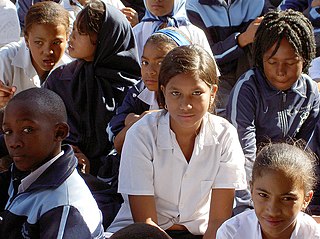Related Research Articles
Telecommunications in Mozambique include radio, television, fixed and mobile telephones, and the Internet.

Telecommunications infrastructure in South Africa provides modern and efficient service to urban areas, including cellular and internet services. The Independent Communications Authority of South Africa (ICASA) is the watchdog of the telecommunications in the country.
A business incubator is an organization that helps startup companies and individual entrepreneurs to develop their businesses by providing a fullscale range of services, starting with management training and office space, and ending with venture capital financing. The National Business Incubation Association (NBIA) defines business incubators as a catalyst tool for either regional or national economic development. NBIA categorizes its members' incubators by the following five incubator types: academic institutions; non-profit development corporations; for-profit property development ventures; venture capital firms, and a combination of the above.

The New Partnership for Africa's Development E-School Program is included as a means to provide ICT equipment such as computers and internet access to all schools in member nations within The New Partnership for Africa's Development (NEPAD) program. NEPAD parents the E-School Program and is an economic program that aims to bring economic and social development to African nations and ensure 'Africa's Renewal'. The E-School Program began with Demonstration Projects and has developed further yet remains a work in progress in many countries, facing both criticism and support.

Educational Systems in S.A
Neotel, previously SNO Telecommunications, is the second national operator (SNO) for fixed line telecommunication services in South Africa. It was unveiled on 31 August 2006 in Kyalami in Midrand. Neotel is South Africa's first direct telecommunications competitor to the current telecommunications parastatal, Telkom.

The Internet in South Africa, one of the most technologically resourced countries on the African continent, is expanding. The internet country code top-level domain (ccTLD) .za is managed and regulated by the .za Domain Name Authority (.ZADNA) and was granted to South Africa by the Internet Corporation for Assigned Names and Numbers (ICANN) in 1990. Over 60% of Internet traffic generated on the African continent originates from South Africa. As of 2020, 41.5 million people were Internet users.

Sophia Bekele Eshete is an entrepreneur, corporate executive, governance and risk management specialist, policy advisor on ICT, commentator and philanthropist.

The West Africa Cable System (WACS) is a submarine communications cable linking South Africa with the United Kingdom along the west coast of Africa that was constructed by Alcatel-Lucent. The cable consists of four fibre pairs and is 14,530 km in length, linking from Yzerfontein in the Western Cape of South Africa to London in the United Kingdom. It has 14 landing points, 12 along the western coast of Africa and 2 in Europe completed on land by a cable termination station in London. The total cost for the cable system is $650 million. WACS was originally known as the Africa West Coast Cable (AWCC) and was planned to branch to South America but this was dropped and the system eventually became the West African Cable System.

Vinny Lingham is a South African-born American Internet entrepreneur who is the co-founder & CEO of an identity protection and management startup based in California called Civic. He was also previously the founder and CEO of Gyft & Yola, Inc. He is also the co-founder of SiliconCape, an NGO based in South Africa that aims to turn Cape Town into a technology hub.

The Meltwater Entrepreneurial School of Technology (MEST) is an Africa-wide technology entrepreneur training program, seed fund, and incubator headquartered in Accra, Ghana. The three-phased institution was founded in 2008 to provide training, investment, and mentoring for aspiring technology entrepreneurs with the goal of creating globally successful companies that create wealth and jobs locally in Africa.

Andile Abner Ngcaba is a South African businessman who has devoted most of his life and career to the field of technology, in particular communications.
iHub is an Innovation hub and hacker space for the technology community in Nairobi. It was started in March 2010 by Erik Hersman, a blogger, TED fellow, and entrepreneur and acquired by Co-creation Hub (CcHUB) in 2019. This coworking space, in Senteu Plaza at the junction of Lenana and Galana Roads, is a nexus for technologists, investors, young entrepreneurs, designers, researchers and programmers.

Matthew Buckland was a South African Internet entrepreneur and businessman who founded and exited digital agency and publisher Creative Spark, acquired in 2015 by UK firm M&C Saatchi PLC, the holding group of M&C Saatchi. Buckland was also the founder of Burn Media, a suite of technology publishing brands which includes Memeburn, Ventureburn.com, Gearburn.com and others.
The digital divide is described as the characterisation of the gap between individuals or countries that have access to information and communications technologies, primarily telecommunications and the Internet, and individuals or countries that do not. This also includes, but is not limited to: access to computers, broadband, information literacy and digital skills.
Nailab is a Kenyan startup incubator, located in Nairobi, that was founded in 2010 by Tonee Ndungu and Bart Lacroix. In 2012 Tonee Ndungu left to found Kytabu, and EdTech company based in Nairobi, Kenya. The company incubates technology-based companies and offers 3–6 months entrepreneurship programs with a focus on growing innovative technology driven ideas.
The use of new media in Ghana like elsewhere is growing. The Information and Communications Technologies (ICT) sector, which is based on a free market approach, has promoted new media use. Most popular aspects of new media to Ghanaians is the Internet, and its associated mobile and desktop applications for education, health, politics, business, publishing, governance and so on. Also popular is the use of mobile devices like smartphones and tablets and computers.

Riovic Capital Group, or simply Riovic, is a financial technology and investment company that specializes in emerging technologies.
Science and technology in Uganda examine government efforts to develop a national innovation system and the impact of these policies.
References
- 1 2 3 4 5 "Background & Launch". Silicon Cape. 2009-10-21. Retrieved 2017-05-17.
- ↑ http://sarocks.co.za/2009/10/14/silicon-cape-is-rocking-south-africa/ Accessed August 2010
- 1 2 3 4 Vegter, Ivo (2009-10-09). "Silicon Cape creates real 'buzz'". ITWeb Technology News. Retrieved 2017-05-17.
- ↑ "Launch Materials & Media". Silicon Cape. 2009-10-21. Retrieved 2017-05-17.
- ↑ Buckland, Matthew (2009-10-08). "Opening speech @ #SiliconCape | Matthew Buckland". matthewbuckland.com. Retrieved 2017-05-17.
- ↑ Carew, Joanne (2012-10-15). "Silicon Cape appoints new chairperson". ITWeb Technology News. Retrieved 2017-05-17.
- 1 2 "Vision & Objectives". Silicon Cape. 2009-10-21. Retrieved 2017-05-17.
- ↑ "The Silicon Cape | Vinny Lingham's Blog". Archived from the original on 2010-10-19. Retrieved 2010-08-22. Accessed August 2010
- ↑ https://twitter.com/SeacomLive/status/3424615050 Accessed August 2010
- ↑ http://www.fin24.com/Business/Silicon-Cape-sees-light-of-day-20091008 Accessed August 2010
- ↑ http://www.moneyweb.co.za/mw/view/mw/en/page292681?oid=493585&sn=2009+Detail Accessed August 2010
- ↑ "Tech Leader » Reader Blog » the Silicon Cape". Archived from the original on 2012-09-11. Retrieved 2010-08-22. Accessed 2010
- ↑ http://www.slideshare.net/BrandsEye/silicon-cape-event-2 Accessed August 2010
- ↑ "Google launches local tech incubator initiative" . Retrieved 30 March 2011.
- ↑ http://www.justinstanford.com/2010/03/sa-gets-its-first-crowd-funded-angel-network/ Accessed August 2010
- ↑ Carew, Joanne (2014-10-15). "FNB backs Silicon Cape". ITWeb Technology News. Retrieved 2017-05-17.
- ↑ http://www.sablogawards.com/Results-2016.aspx SA Blog Awards
- ↑ "Make W Cape tax free - Rupert" . Retrieved 30 March 2011.
- 1 2 "Cape Town could become South Africa's Silicon Valley". Times Live. Retrieved 30 March 2011.
- ↑ "Ground-Breaking Decision for South African Intellectual Property" . Retrieved 30 March 2011.
- ↑ https://techcrunch.com/2010/05/18/building-silicon-cape-how-much-of-a-difference-can-one-guy-make/ Accessed August 2010
- ↑ http://badentrepreneur.bundublog.com/2010/02/22/silicon-cape-is-coming-to-gauteng/ Accessed August 2010